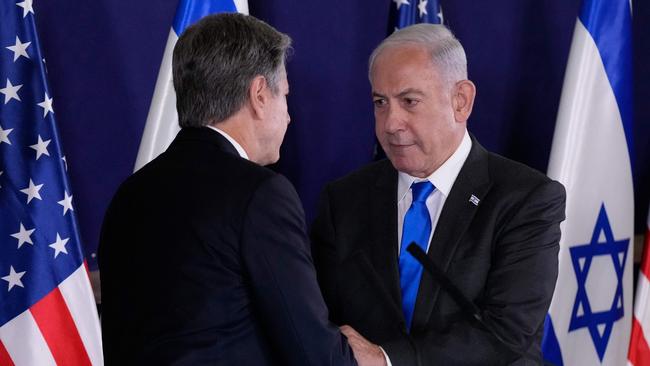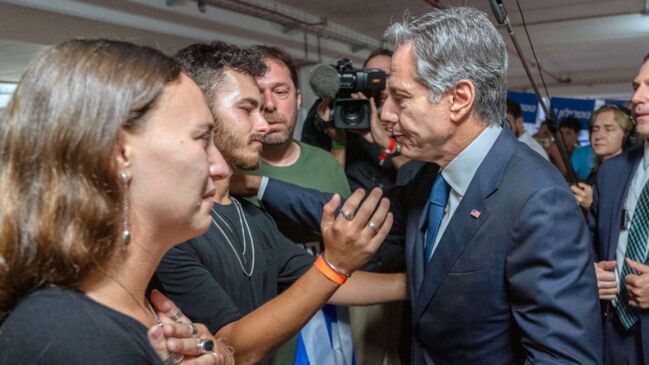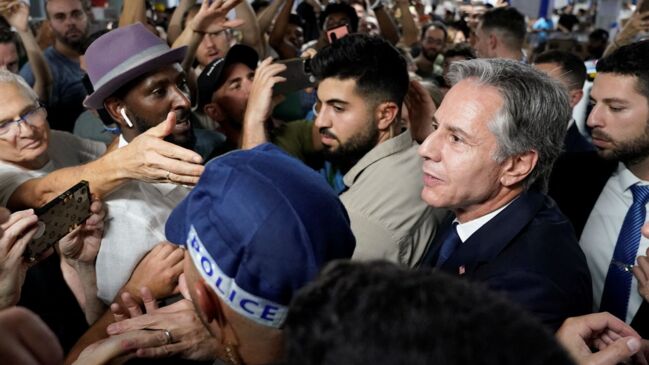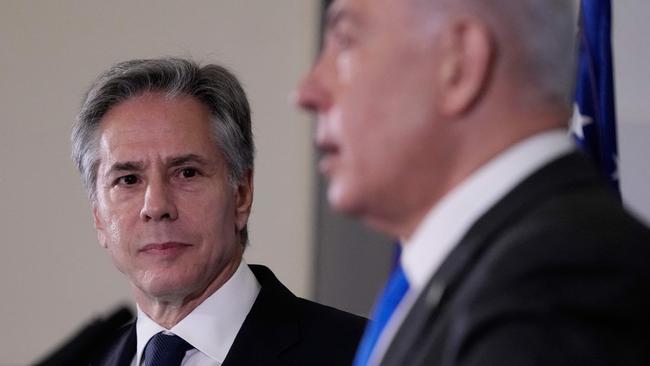Israel aims to dismantle Hamas as Blinken tries to prevent wider war
The visiting US Secretary of State urged Israel to avoid civilian casualties amid growing fears of a wider regional conflict as Israeli forces embark on a campaign to dismantle Hamas.

US Secretary of State Antony Blinken urged Israel to avoid civilian casualties amid growing fears of a wider regional conflict as Israeli forces embarked on a military campaign to dismantle Hamas, pounding Gaza with airstrikes.
Israel on Thursday gave the clearest indication so far of its war aims, with the military saying it plans to capture or kill all of Hamas’s leaders, destroy the group’s militant units and make it impossible for the group - which the US, Israel and others have designated a terrorist organization - to govern Gaza.
“Hamas is ISIS and, just as ISIS was crushed, so too will Hamas be crushed,” Israeli Prime Minister Benjamin Netanyahu said. “No country should harbor them, and those that do should be sanctioned.” Flanking Netanyahu, Blinken said Israel had the right to defend itself, but the top U.S. diplomat urged the Israeli prime minister to take precautions to avoid harming civilians.
“How Israel does this matters. We democracies distinguish ourselves from terrorists by striving for a different standard,” Blinken said.
Israeli military spokesman Richard Hecht said overnight airstrikes targeted a Hamas unit that Israel says was involved in the weekend attack that killed 1,300 Israelis. One of the Hamas operatives killed in the airstrikes was responsible for creating videos of the violence that spread over social media, Hecht said.
“We plan to get to every one of these people -- every single one of them, ” Hecht said.
Israel’s bombardment of Gaza since Saturday has killed more than 1,500 Palestinians, nearly half of whom are women and children, and has injured more than 6,600, according to the health authority there. More than a dozen health facilities have come under attack, the authority said.
Most of the strip’s more than two million residents have no way of fleeing the enclave, which Israel and Egypt have sealed off for years.
The conflict risks spilling over into a broader regional crisis. Israel has massed about 300,000 reserve troops, positioning many of them near the border with Gaza, ahead of a possible ground invasion.
On Thursday, simultaneous airstrikes hit Syria’s international airports in Damascus and Aleppo, Syria’s state-run media said, blaming Israel for the attacks. Syrian air defenses were responding to the attacks, which rendered both airports nonoperational. The attacks came as the Iranian foreign minister was expected to arrive in the country. The Israeli military declined to comment.

Israeli forces have also exchanged fire with Hezbollah, the Iranian-backed militant group, along Israel’s northern border with Lebanon for four consecutive days. Hezbollah has a powerful militia of fighters who are battle-tested from the war in neighboring Syria and an arsenal of missiles capable of striking deep inside Israel.
Blinken was on a one-day visit to Israel before a tour of Arab countries -- Jordan, Qatar, Saudi Arabia, the United Arab Emirates and Egypt -- aimed in part at dissuading other states or militant groups from joining the conflict.
Diplomats see Blinken’s tour as an opportunity to map out a public response for Arab capitals if Israel invades Gaza. One Arab diplomat warned that images of a leveled Gaza risk fueling terrorism. It also risks bolstering the legitimacy of Hamas and emboldening Hezbollah and Yemen’s Houthis, the diplomat said.
“It’s our determination -- and that of Israel as well -- that there not be a second front or a third front,” Blinken told reporters Thursday in Tel Aviv.
The Pentagon said a squadron of A-10 ground attack planes arrived at al Dhafra Air Base, in the United Arab Emirates, on Thursday as part of the Biden administration’s effort to deter further attacks against Israel. A U.S. aircraft carrier strike group arrived in the Eastern Mediterranean earlier in the week, and additional squadrons of jet fighters are expected to be in place by next week, U.S. defense officials said.
Western officials are concerned the conflict could spread to the Israeli-occupied West Bank, which is partly governed by the Palestinian Authority. Hamas has called for a “general mobilization” throughout the region in support of Palestinians, urging young people in the West Bank to confront Israeli soldiers.
Since Hamas’s surprise assault on Saturday, 35 Palestinians in the West Bank have been killed in clashes with Israeli forces, as well as in deadly incidents with armed Israeli settlers, according to Palestinian and Israeli officials.

In a sign of spreading violence, on Thursday evening, a Palestinian gunman opened fire on Israeli policemen in Jerusalem, injuring two officers, one seriously. The gunman was “neutralized” by police officers while fleeing, Israeli police said.
In a speech broadcast on Al Jazeera Thursday night, Abu Obeida, the spokesman for Hamas’s military wing, said the group had been preparing its attack on Saturday since its last conflict with Israel in the spring of 2021. That was the first time the group fought Israel over tensions at holy sites in Jerusalem. He said the group is well prepared for an Israeli ground invasion and called on Palestinians everywhere to join the fight.
“It’s a jihad: It’s either win or get martyred,” he said.
Iran’s foreign minister, Hossein Amir-Abdollahian, said that if Israel didn’t cease its bombing and siege of Gaza, the whole region would “will face new situations.” Blinken on Thursday also met with Israeli President Isaac Herzog and members of the cabinet. Later, along with a U.S. hostage negotiator, he met families of American citizens who were killed or still missing after the weekend attacks. The White House said Thursday that the death toll of American citizens has risen to 27 people, while 14 remain unaccounted for.
The White House also said that the U.S. government will arrange charter flights, beginning Friday, to help evacuate Americans from Israel.
Saudi Crown Prince Mohammed bin Salman and Iranian President Ebrahim Raisi discussed the conflict in a phone call Wednesday, according to state media in both countries, marking the first such call since diplomatic ties were restored in March.
Asked about the call, a senior U.S. official said it was important that Iran not act on the current situation. “With the detente of Saudi Arabia and Iran formalized in March, I assume the crown prince thought this was an apt moment,” the official said. The official added that Washington was working with all its partners to use their influence to deter Hamas, Hezbollah and Iran.
Meanwhile, the U.S. and Qatar agreed to deny Iran access to $US6 billion in oil proceeds that Washington had freed up as part of a prisoner swap reached last month, according to people familiar with the matter, amid concerns over Tehran’s long-running support for Hamas.
Israeli interrogations of captured Hamas militants had revealed the whereabouts of key members, Hecht said, as well as military sites, weapons stashes, rocket and antitank-missile launchpads, and areas that the group is trying to penetrate.
Hecht said Hamas is “disoriented right now” with its ability to command and control “a bit out of balance.” Still, the Israeli army was working to secure its borders and get rid of remaining Hamas militants inside Israel as of Wednesday night. More than 100 Israeli tanks have been stationed along the fence with Gaza, with additional barricades to come.
Hecht said no decision has been made yet about a possible ground invasion of the strip. “We are preparing for a ground maneuver if it is decided,” he said.
Israeli airstrikes on Gaza have triggered a mass displacement that is piling pressure on Egypt to open its border with the strip to allow refugees to flee. The White House said the U.S. is discussing with Israel and Egypt options for granting safe passage to Egypt for civilians in Gaza.
An estimated 500 to 600 US citizens live in the Gaza Strip, and some are looking for safe passage out, including over the border into Egypt, the senior U.S. official said.
The Israeli military has urged Palestinians in Gaza to leave via the border crossing with Egypt, but they can’t cross without a special permit.

With Israel’s military having ordered a total siege on Gaza, supplies of food, fuel and water are no longer reaching the enclave, leaving Gazans in the dark with thinning supplies as explosions rock their buildings at night. Gaza’s only power plant ran out of fuel earlier this week.
Grim scenes were emerging from Gaza’s residential neighborhoods, with some people saying that the bombing by the Israeli Air Force appeared to be indiscriminate. Entire communities were sorting through rubble on Thursday, with some intersections completely blocked and thick dust hanging in the air.
“They’re bombing homes with people inside,” said 24-year-old Malak Al Sous, who had packed and was planning to flee her home. She was without electricity, water and internet for two days. “Everything is destroyed,” she said.
Earlier this week, Mahdi Eljamal, a 37-year-old engineer, and his wife went to Al Nasr hospital to take cover, after a neighbor had received a phone call from an Israeli number warning him that buildings in his neighborhood would be destroyed within half an hour. People around him started screaming, trying to evacuate as quickly as they could.
“We have been living in fear for six days now,” Eljamal said. “The bombing never stops.” Israeli military officials say they only target sites that intelligence shows are used by Gaza militants.
At Gaza City’s largest medical complex, Al Shifa Hospital, patients including crying children packed the halls. Some had wounds that were hastily bandaged. Limited electricity supplies were being allocated to operations rooms. Ambulances arrived nonstop carrying the wounded and deceased.The International Committee of the Red Cross warned Thursday that as Gaza loses power, newborns in incubators and elderly patients on oxygen would be at risk and that families were having trouble accessing clean water.
At Gaza City’s largest medical complex, Al Shifa Hospital, patients including crying children packed the halls. Some had wounds that were hastily bandaged. Limited electricity supplies were being allocated to operations rooms. Ambulances arrived nonstop carrying the wounded and deceased.The International Committee of the Red Cross warned Thursday that as Gaza loses power, newborns in incubators and elderly patients on oxygen would be at risk and that families were having trouble accessing clean water.
As of Thursday, 12 employees of the United Nations Relief and Works Agency for Palestine Refugees have been killed since the offensive began over the weekend, the agency said. The Palestinian Red Crescent said four of its medics were killed after Israeli forces struck an ambulance in the northern Gaza Strip.
Israel’s military campaign is unfolding against a brutal backdrop in the country’s south, where authorities are retrieving hundreds of bodies and documenting communities that were targeted by Hamas. Col. (Res) Golan Vach, who headed the recovery of the Israeli dead, said he saw decapitated soldiers, dozens of young people’s bodies burned, women mutilated, and babies without heads.
Summer Said, Menna Farouk, Anas Baba and Stephen Kalin contributed to this article.
The Wall Street Journal







To join the conversation, please log in. Don't have an account? Register
Join the conversation, you are commenting as Logout